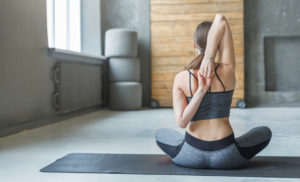by Bridget
 |
| Meditation by Marc Chagall |
Similar to my experience with gratitude practice, when I moved to the Bay Area more than 20 years ago, I found it to be populated by a great number of meditators, many of whom were excited to explain how wonderful their practice was and to share it with me. So over the years I tried it several times, in ashrams, workshops, sitting on the shores of Lake Anza, near the top of a hill on a trail in Claremont Canyon, seated on a bolster in my bedroom…. But I never found my way into it. Lucky for me, I discovered that an inwardly-focused movement practice gives me a similar result to what I hear others experiencing with meditation. So while I’m glad I found a way in through yoga, I still haven’t managed to find a flow with meditation.
Meditation is generally thought of as a way to quiet the mind, and it works wonders for a lot of people, but recently I read an interesting article, Mindfulness and meditation can worsen depression and anxiety, that discusses the possibility of meditation not working for everyone, specifically for people who experience depression. In fact, the author notes:
“About one in 12 people who try meditation experience an unwanted negative effect, usually a worsening in depression or anxiety, or even the onset of these conditions for the first time, according to the first systematic review of the evidence.”
That sounds like a lot, right? But the author also quotes Katie Sparks, a chartered psychologist and member of the British Psychological Society, who explains why this might be true:
“Meditation has been found to help people to relax and refocus and help them both mentally and physically. But sometimes when people are trying to still their thoughts, the mind can “rebel”. It’s like a backlash to the attempt to control the mind, and this results in an episode of anxiety or depression.”
Another topic under this heading is the idea that certain medications should not be mixed with meditation. Dr. Lynn Anjali Somerstein, who is a licensed psychotherapist and yoga therapist, addressed this topic, in response to a reader’s question, here on the Yoga for Healthy Aging Blog. She suggests both working with your doctor and an experienced meditation teacher to be sure there are some safeties in place. She also recommends several books for starting your research, if you’re interested in learning more.
All of this to say that, while meditation can bring great comfort to many people, it might not be for everyone. I still haven’t written it off my list entirely, but if I go back in, it will be under the guidance of a very experienced teacher.
Find information on Bridget’s current classes here (all online during the pandemic).
Subscribe to Yoga for Healthy Aging by Email ° Follow Yoga for Healthy Aging on Facebook ° To order Yoga for Healthy Aging: A Guide to Lifelong Well-Being, go to Amazon, Shambhala, Indie Bound or your local bookstore.
by Bridget Meditation by Marc ChagallSimilar to my experience with gratitude practice, when I moved to the Bay Area more than 20 years ago, I found it to be populated by a great number of meditators, many of whom were excited to explain how wonderful their practice was and to share it with me. So over the years I tried it several times, in ashrams, workshops, sitting on the shores of Lake Anza, near the top of a hill on a trail in Claremont Canyon, seated on a bolster in my bedroom…. But I never found my way into it. Lucky for me, I discovered that an inwardly-focused movement practice gives me a similar result to what I hear others experiencing with meditation. So while I’m glad I found a way in through yoga, I still haven’t managed to find a flow with meditation.Meditation is generally thought of as a way to quiet the mind, and it works wonders for a lot of people, but recently I read an interesting article, Mindfulness and meditation can worsen depression and anxiety, that discusses the possibility of meditation not working for everyone, specifically for people who experience depression. In fact, the author notes:“About one in 12 people who try meditation experience an unwanted negative effect, usually a worsening in depression or anxiety, or even the onset of these conditions for the first time, according to the first systematic review of the evidence.”That sounds like a lot, right? But the author also quotes Katie Sparks, a chartered psychologist and member of the British Psychological Society, who explains why this might be true:“Meditation has been found to help people to relax and refocus and help them both mentally and physically. But sometimes when people are trying to still their thoughts, the mind can “rebel”. It’s like a backlash to the attempt to control the mind, and this results in an episode of anxiety or depression.”Another topic under this heading is the idea that certain medications should not be mixed with meditation. Dr. Lynn Anjali Somerstein, who is a licensed psychotherapist and yoga therapist, addressed this topic, in response to a reader’s question, here on the Yoga for Healthy Aging Blog. She suggests both working with your doctor and an experienced meditation teacher to be sure there are some safeties in place. She also recommends several books for starting your research, if you’re interested in learning more. All of this to say that, while meditation can bring great comfort to many people, it might not be for everyone. I still haven’t written it off my list entirely, but if I go back in, it will be under the guidance of a very experienced teacher.Find information on Bridget’s current classes here (all online during the pandemic). Subscribe to Yoga for Healthy Aging by Email ° Follow Yoga for Healthy Aging on Facebook ° To order Yoga for Healthy Aging: A Guide to Lifelong Well-Being, go to Amazon, Shambhala, Indie Bound or your local bookstore. Read More
Read More







